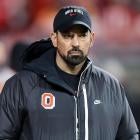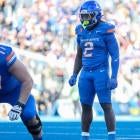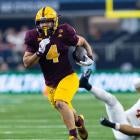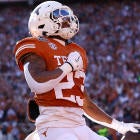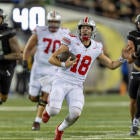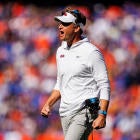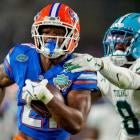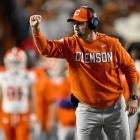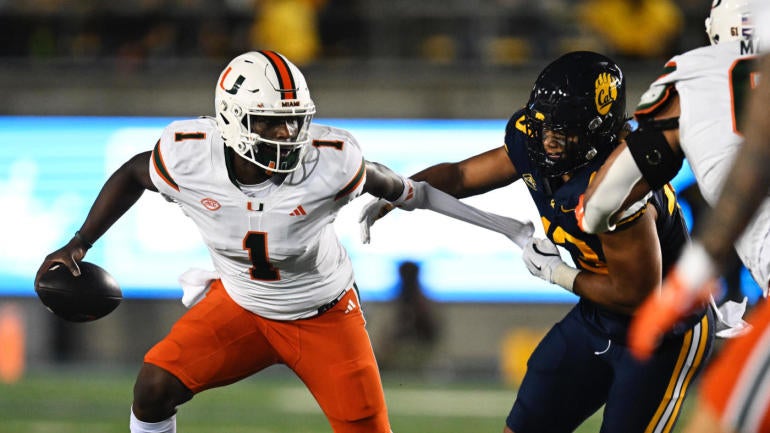
The final ranked game on the Week 6 college football slate didn't disappoint, as No. 8 Miami completed an improbable comeback to stun Cal. The Hurricanes trailed 35-10 in the third quarter and outscored Cal 21-3 in the final period to seal the 39-38 comeback win. The 25-point hole Miami overcame was the largest comeback by an FBS team this season and the second largest in program history (28 points at Boston College in 1999).
On Miami's first play on its game-winning drive, Cameron Ward connected with star receiver Xavier Restrepo for a 77-yard gain to get deep into Cal territory. Five plays later, Ward connected with Elijah Arroyo for a 5-yard touchdown with 26 seconds left.
Ward finished with 437 yards and two touchdowns. Restrepo caught a game-high seven passes for 163 yards.
Here are three reasons Miami was able to pull off the biggest comeback of the season
Fourth quarter surge
The Hurricanes had 18 points and 297 yards through the first three quarters, then outscored Cal 21-3 in the fourth quarter, which saw them outgain the Bears 278-26. Take a look at Miami's possessions in the fourth quarter, compared to Cal (we start with the first play of the fourth quarter, which was second down for Cal after a one-yard run).
| Team | Drive Number | Plays | Yards | Result | Time Off Clock |
|---|---|---|---|---|---|
| Cal | 1 | 3 | 2 | 37-yard FG | 42 seconds |
| Miami | 1 | 11 | 75 | TD | 3:45 |
| Cal | 2 | 5 | 8 | Punt | 3:46 |
| Miami | 2 | 9 | 70 | TD | 2:38 |
| Cal | 3 | 4 | 21 | Punt | 2:22 |
| Miami | 3 | 6 | 92 | TD | 1:16 |
| Cal | 4 | 4 | 0 | Interception | 21 seconds |
Miami averaged five yards a play through the first three quarters, then turned it up to 10.3.
Cam Ward saves his best for last
The first three quarters were an abject disaster for Ward's Heisman Trophy chances as he showed bouts of inconsistency and bad decision-making that had stymied him at prior stop Washington State. But he sure delivered his magic, accounting for 277 yards and three touchdowns in the fourth frame. Ward threw for 238 yards in the fourth, compared to 199 the previous three quarters, and he was able to balance extending plays/creating explosives with keeping the football out of harm's way, which isn't always a given with Ward.
"Week in and week out, when [Ward] has the ball in his hand, the game's never over," wide receiver Xavier Restrepo said. "We have extreme confidence in that guy and I love and respect that guy so much. We kept on fighting."
Justin Wilcox schemed up drop zone coverage and some confusing back-end looks for Ward, who got more comfortable the more he saw it. His long strike to Restrepo to put Miami in position to win the game was against a zone look. Cal played zone 71% of the time against Ward, according to TruMedia.
Controversial non-call gives Miami life
Cal had a chance to seal the win on its penultimate possession before Miami took the lead for good but couldn't move the sticks to run out the clock. On third-and-12, Cal quarterback Fernando Mendoza attempted to scramble up the middle for a first down but was met with a big hit by Miami defender Wesley Bissainthe, resulting in only a four-yard gain. The hit, which Bissainthe appeared to initiate with his helmet, was reviewed after the fact for targeting.
Sure ticks a lot of boxes for targeting. pic.twitter.com/80BKwe5xHl
— Bryan Fischer (@BryanDFischer) October 6, 2024
The NCAA defines targeting as such:
The rule stipulates that no player shall target and make forcible contact to the head or neck area of a defenseless player or contact an opponent with the crown (top) of their helmet. The definition of "crown of the helmet" focuses the attention on the top of the helmet.
The play was reviewed after the fact for targeting, but the referees on the field confirmed targeting didn't happen. It was the second week in a row Miami had a replay go in its favor to win a game, as referees last week overturned a Virginia Tech touchdown pass that would have handed the Hurricanes its first loss at the final seconds.
Miami won't apologize for any replay luck, nor should it. The Hurricanes are 6-0 for the first time since 2017. Several College Football Playoff teams in recent years benefited from close, sometimes-lucky wins -- TCU in 2022, Washington in 2023. Each of those teams made it to the national championship.








